Signalling Rail Safety And Reliability
Like most children, Ms Ng Yuen Fong used to peek curiously at the MRT tracks through the station platform’s screen doors before the train arrived.
As fate would have it, she now spends a good part of her time at work observing the tracks in her role as a permanent way (P-way) engineer. Looking back fondly at her younger self, Ms Ng, who joined SMRT Trains in 2015, enthused: “I never thought that I would one day become the cool person who gets to walk and work on the track!”

As a permanent way engineer, Ms Ng Yuen Fong helps ensure that the tracks are in optimal condition for the safe passage of trains.
As their job titles suggest, the main job scope of P-way engineers revolves around the permanent way – the railroad tracks on which trains run.
“The permanent way is the backbone of safe and efficient railway operations,” explained Ms Ng. “As a P-way engineer, it is my responsibility to ensure that the tracks are in optimal condition to facilitate the safe passage of trains, and improve operational reliability.”
For trains to run smoothly, railway tracks must be properly aligned and levelled, while sleepers – which support the rails and distribute the load of the train – must be securely fastened and correctly spaced. P-way engineers like Ms Ng review data from track condition monitoring systems and inspection teams; plan and supervise maintenance; and oversee the repair and replacement of various track components.
With the advancement of technology, P-way engineers are using tools to fuel developments in the rail industry. For instance, they use the linear variable differential transformer, which allows real-time monitoring of the third rail’s position – the live rail which provides electric power to a train through a conductor placed along the rails. P-way engineers also get to work with multi-function vehicles, which are engineering trains equipped with a rail flaw detection and track geometry measurement system.
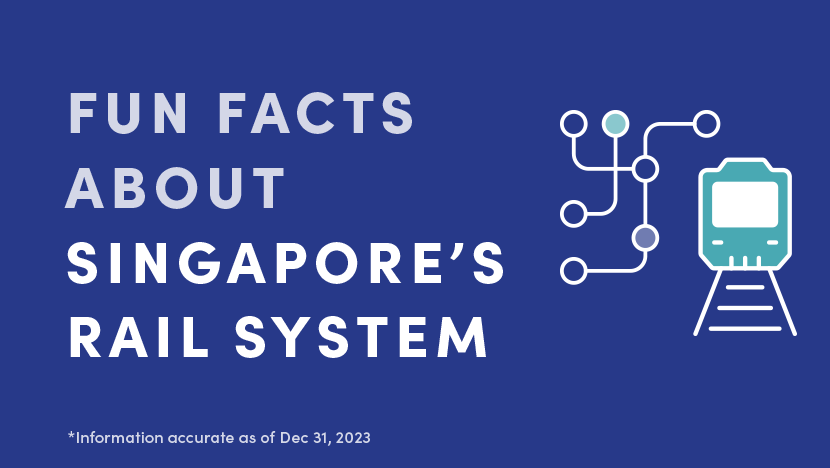
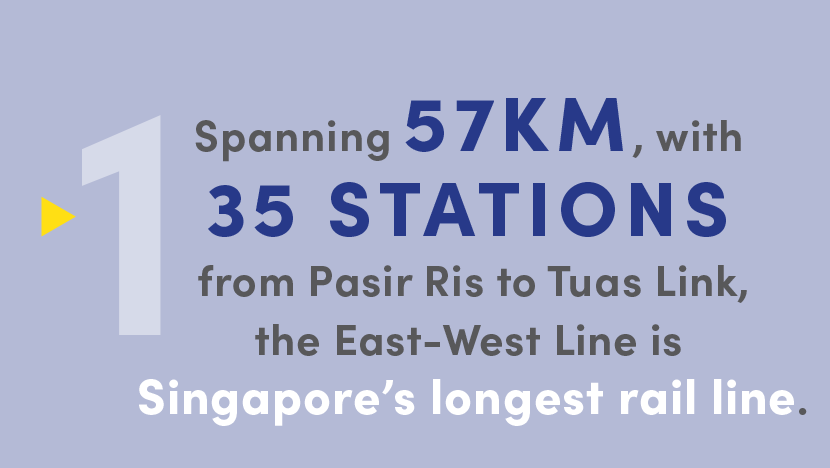



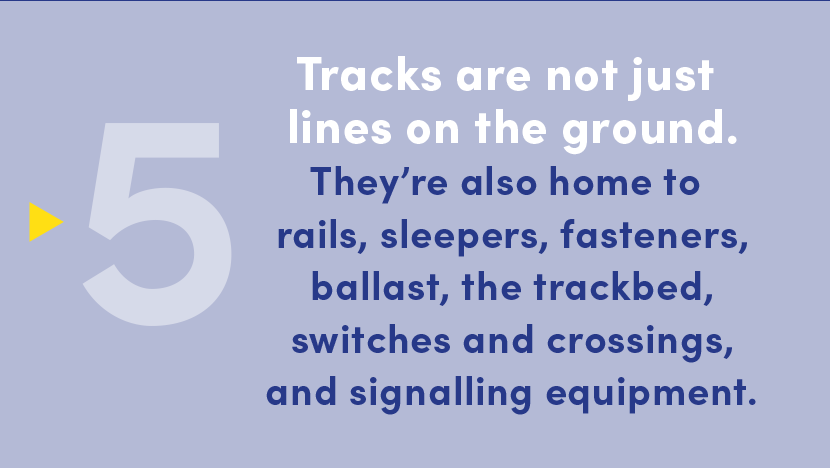

BALANCING TECHNICAL KNOWLEDGE WITH INTERPERSONAL AND PROBLEM-SOLVING SKILLS
In her capacity as a P-way engineer at SMRT Trains, Ms Ng has worked in project management, overseeing a team of 20 technical staff involved in a S$50 million asset renewal project.
Her experience in managing large-scale projects has bolstered her confidence in balancing stakeholder expectations with operational integrity and safety to ensure the best outcomes in her current role at SMRT.

“ONE OF THE HIGH POINTS OF MY CAREER WAS BEING A PART OF THE TEAM THAT EXECUTED TRACK RENEWAL WORKS. THIS IS NOW COMING TO FRUITION AFTER YEARS OF CONCEPTUALISATION, PLANNING, COORDINATION AND OVERCOMING NUMEROUS CHALLENGES – INCLUDING THE IMPACT OF THE COVID-19 PANDEMIC.”
– MS NG YUEN FONG, P-WAY ENGINEER, SMRT TRAINS
“To succeed as a P-way engineer, one needs a combination of hard and soft skills,” she reflected. “While a solid grasp of technical knowledge and regulatory standards is fundamental, the capacity for risk assessment, innovative problem-solving and clear communication are equally crucial for performing daily tasks to the highest standards.”
Ms Ng, who attained her Postgraduate Certificate in Urban Railway Engineering from the University of Birmingham in 2019, hopes to continue enhancing her skillset and to acquire international experience, which will strengthen her portfolio in preparation for taking on leadership roles.
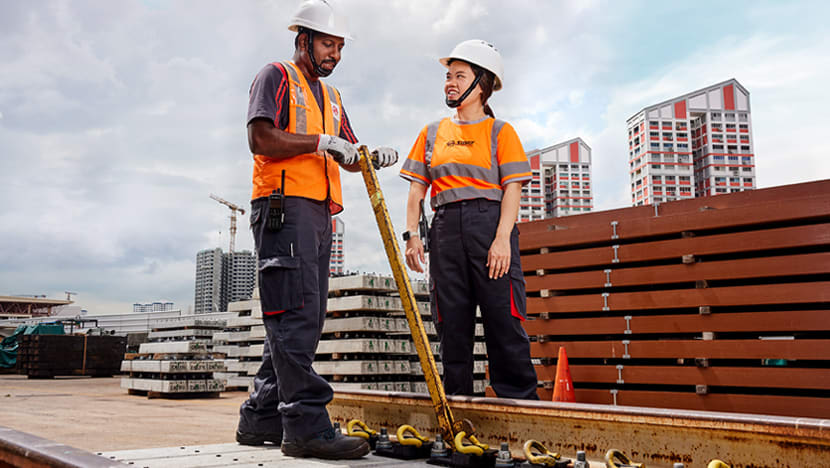
Ms Ng (right) says that the capacity for risk assessment, innovative problem-solving and good communication skills are crucial for succeeding as a P-way engineer.
Her advice to young engineers who are looking to establish themselves in permanent way careers is to embrace every challenge with a positive mindset.
“Challenges offer valuable learning experiences and opportunities to showcase your competence. Stay curious and committed to continuous learning, and proactively build your professional network by seeking out mentors and patrons,” she said.


A CLEAR SIGNAL OF PROGRESSION
Ms Tan Hou Zuo is another dedicated professional in the rail engineering sector.
Commencing her journey in 2015 as a fresh graduate at SBS Transit after receiving her Bachelor of Electrical and Electronics Engineering degree from Nanyang Technological University, she progressed from being a signalling engineer to her current role as an assistant engineering manager.

Ms Tan Hou Zuo, assistant engineering manager, has been with SBS Transit since 2015.
Overseeing a team that maintains and enhances the rail signalling system on the North East Line (NEL), Ms Tan’s main duty is to ensure that they perform their work precisely and safely. To ensure the safe and efficient operation of Singapore’s rail system, she also works closely with her team to identify and troubleshoot any signalling-related issues.
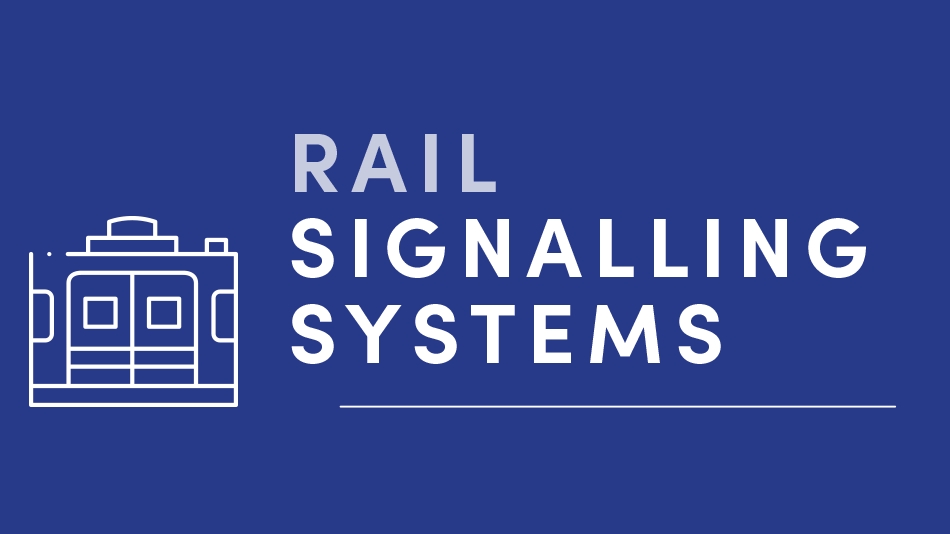

“I feel a deep sense of satisfaction and purpose knowing that my work contributes to the smooth operation of our rail network, ensuring safe and reliable journeys for our commuters,” said Ms Tan.
Ms Tan reviews any fault and delay reports from the day before to see if follow-up actions are needed and prepares information updates ahead of time for management. Other tasks that fall under her purview include work instructions, risk assessments, technical drawings, manuals, method statements, project schedules, as well as quotations or specifications submitted by suppliers.
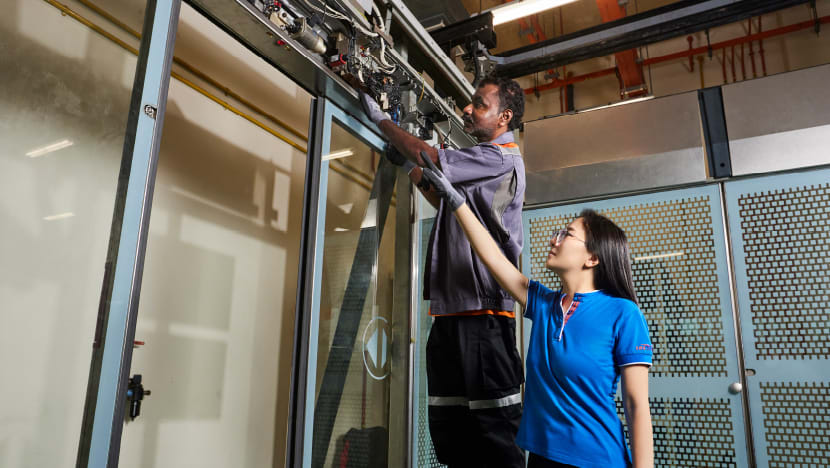
Ms Tan (right) finds fulfilment in her work when her team excels in audits and promptly rectifies signalling issues.
While the rail industry still has a higher ratio of male to female engineers, this vibrant and ever-evolving sector is constantly looking to hire driven and passionate individuals from diverse backgrounds to contribute to the enhancement of Singapore’s rail systems.
Furthermore, Ms Tan believes that equal opportunities for progress and growth are extended to all, regardless of gender, age or race: “In my experience, advancement is based on one’s skills and the value one brings to the team.”
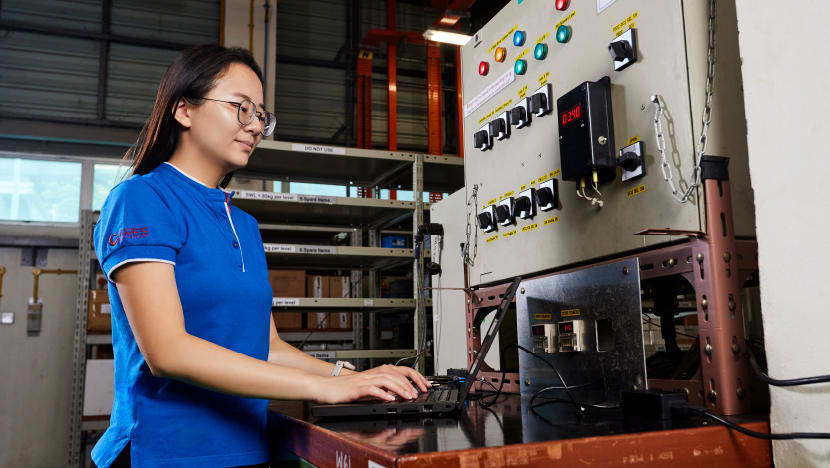
Ms Tan believes that equal opportunities for progress and growth are extended to anyone in the rail engineering sector, regardless of their gender, age or race.
With the expansion of Singapore’s rail network, the implementation of new systems and software not only facilitates expansion but also introduces improved approaches, revolutionising processes to enhance safety and reliability for commuters and rail professionals.
Rail engineering professionals get to work with advanced technologies such as the condition monitoring system for the point machines on the North East Line’s (NEL) Punggol and HarbourFront stations, which uses artificial intelligence to predict potential faults. This enables Ms Tan and her team to take immediate action to rectify issues before they affect the rail service’s reliability.
THE SINGAPORE RAIL (SGRAIL) INDUSTRY SCHOLARSHIP
The SGRail Industry Scholarship offers individuals the chance to embark on the initial phase of their journey in shaping and advancing the future of the rail industry. SGRail scholars are able to hone deep-rail operations and engineering-domain knowledge in areas such as signalling, rolling stock, power, permanent way and systems.
They will also gain exposure to projects at LTA, SBS Transit Ltd or SMRT Corporation Ltd through a structured developmental programme that provides insights into both the public and private sectors within the industry.
THE IMPORTANCE OF TEAMWORK AND BEING A PROACTIVE LEARNER
As a manager, Ms Tan said she experiences her greatest job satisfaction when her team excels in audits and promptly rectifies signalling issues, minimising inconvenience to commuters.
“While my team is usually proficient in their tasks, extenuating circumstances can make it challenging and stressful for them. Witnessing their ability to excel under pressure always fills me with a sense of pride, as it underscores the effectiveness of my guidance.”
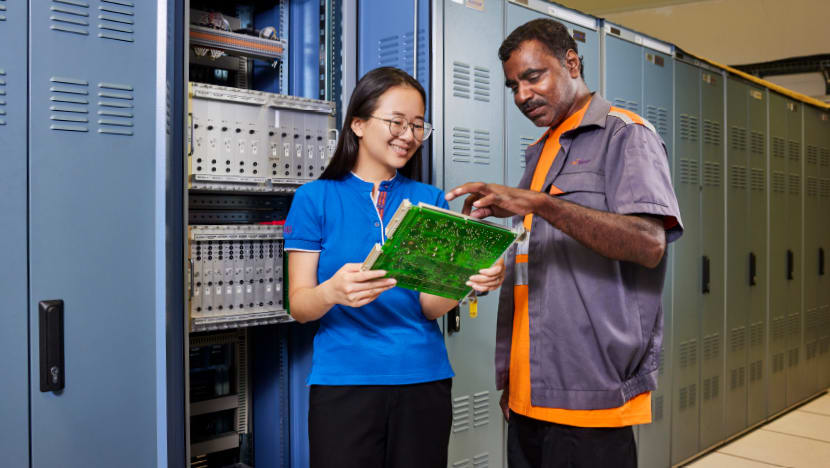
“STAY CURIOUS AND NEVER BE AFRAID TO ASK QUESTIONS. START TAKING CHARGE OF YOUR LEARNING JOURNEY AND ENDLESS OPPORTUNITIES WILL COME YOUR WAY.”
– MS TAN HOU ZUO, ASSISTANT ENGINEERING MANAGER, SBS TRANSIT
To stay abreast of new developments and technological advancements, Ms Tan actively seeks out training opportunities and courses to upskill herself. “The rail industry offers ongoing learning opportunities due to the constant development of new systems and projects,” she said.
“In preparation for the implementation of new software and systems as part of the ongoing expansion of the NEL, I attend trainings and study technical specification documents as part of my upskilling. I appreciate that SBS Transit actively supports the continuous enhancement of our skillsets.”

